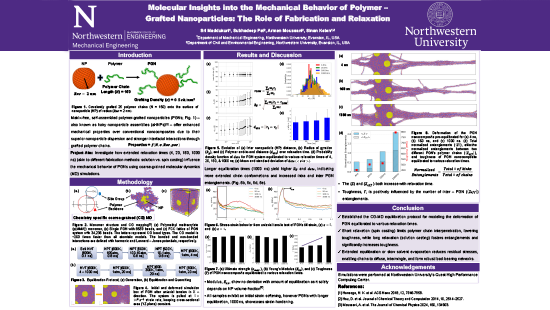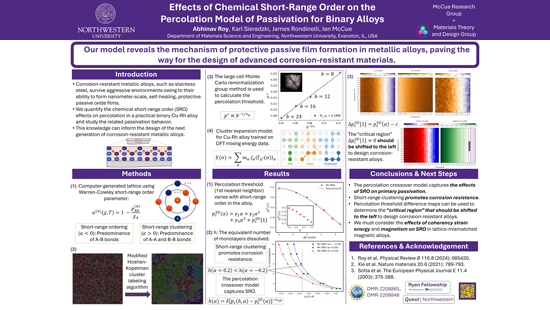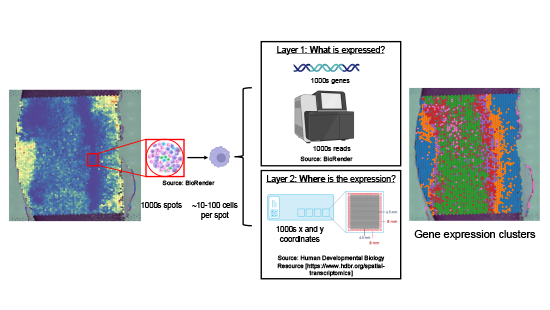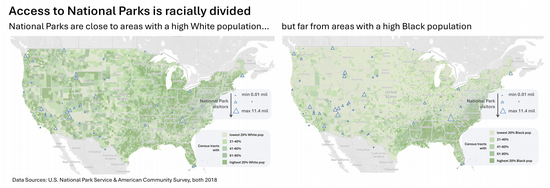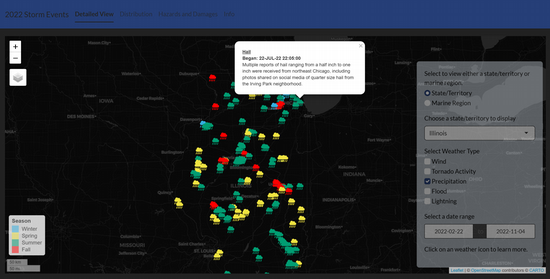CoDEx 2025 - The Best of the Best
We are pleased to announce the winners of the CoDEx 2025 Poster Session, Lightning Talks, and Visualization Challenge. Thank you to all the participants, and congratulations to the award recipients!
Twenty posters were presented; however, only undergraduate and graduate students were eligible for the awards. We are pleased to announce the recipients of the CoDEx 2025 Poster Session.
Poster Winners
First Place
Molecular Insights into the Mechanical Behavior of Polymer-Grafted Nanoparticles: The Role of Fabrication and Relaxation
Sri Maddukuri, PhD Student, McCormick School of Engineering and Applied Science
The integration of inorganic nanoparticles into polymers has significantly transformed the paradigm of material design. By grafting polymer chains directly onto the nanoparticle surface, polymer-grafted nanoparticles (PGNs) exhibit enhanced mechanical, thermal, and electrical properties compared to polymer melts.
Second Place
Effects of Chemical Short-Range Order on the Percolation Model of Passivation for Binary Alloys
Abhinav Roy, PhD Student, McCormick School of Engineering and Applied Science
Metallic alloys exhibit corrosion resistance due to the formation of a passive oxide film. To better understand passive film formation, we develop a percolation model to investigate the effects of chemical short-range order (SRO) on the aqueous passivation of face-centered cubic (FCC) binary alloys to account for chemical ordering/clustering in nominally random solid solutions.
Awards
Poster presentations were evaluated based on poster content and in-person presentation. Thank you to our dedicated judges.
- First Place: Conference fees, travel, and related expenses, up to $3,000, to attend a research-related conference
- Second Place: $500 Visa gift card
Thank you to our corporate sponsors for making the awards possible.
Six graduate and undergraduate students from various disciplines at Northwestern presented a lightning talk at CoDEx 2025.Lightning Talks are five-minute, highly focused talks designed to showcase interesting projects, spark discussions, and ignite collaborations across a wide range of research fields.
Lightning Talks Winner
Spatial Transcriptomics Analysis of Simian Immunodeficiency Virus in the Brain of Rhesus Macaques Enables Characterization of the Viral Reservoir in the Central Nervous System
Eliana Crentsil, PhD Student, McCormick School of Engineering and Applied Science
Human Immunodeficiency Virus (HIV) causes an infection that compromises the immune system and progresses to Acquired Immunodeficiency Syndrome (AIDS) if untreated. Antiretroviral therapy (ART) has demonstrated remarkable success in the treatment of HIV by enabling the long-term suppression of viremia. However, the interruption or cessation of ART almost always results in a rapid rise in viral load referred to as viral rebound.
Award
Lightning Talks were evaluated on their clarity and relevance to CoDEx's computational research focus, and balanced based on their topics to provide a broad representation of the research activities at Northwestern. Thank you to our dedicated judges.
Award: $500 Visa gift card
Thank you to our corporate sponsors for making the awards possible.
Postdocs, graduate and undergraduate students at Northwestern were eligible to enter the CoDEx 2025 Visualization Challenge and to receive an award. Thank you to all the participants.
Awards were given for the top static visualization (i.e., charts/graphs, illustrations, and/or infographics, which may include text) and interactive visualization (i.e., web applications, interactive tools, and/or smartphone or tablet apps that require user input). Congratulations to all!
Visualization Winners
Top Static Visualization
Access to National Parks is Racially Divided
Alice Kang, PhD Student, Weinberg College of Arts and Sciences
Figure caption: Racial disparities in National Park access utilizing 2018 data from the National Park Service and U.S. Census Bureau. Park visitation is represented by marker size and racial composition by monochromatic choropleth maps, avoiding bias and ensuring accessibility for viewers with color-vision deficiency. Read more about this visualization.
Top Interactive Vizualization
2022 Storm Events Throughout the U.S.
Corbin Diaz, Undergraduate Student, Weinberg College of Arts and Sciences
Figure caption: This interactive visualization enables users to explore the distribution of significant weather events in the United States. The data, sourced from the NOAA, includes major weather reports across U.S. states, territories, and marine regions for 2022. However, this visualization can be adapted to view data from any year or multiple years. Read more about this visualization.
Awards
Visualizations were evaluated based on presentation clarity and aesthetics, visualization method used, and accessibility.
- Award: $500 Visa gift card
Thank you to our corporate sponsors for making the awards possible.
Thank you to our dedicated judges:
- Llewellyn Fernandes, Data Management Specialist, Northwestern IT, Research Computing and Data Services
- Aaron Geller, Lead Data Scientist, Northwestern IT, Research Computing and Data Services
- Joe Germuska, Executive Director Knight Lab, Medill School of Journalism, Media, Integrated Marketing Communications
- Yangyang Li, Ph.D. Candidate, Driskill Graduate Program, Northwestern Feinberg School of Medicine
- Sarah Thorngate, Data Analysis Librarian, Northwestern Libraries
